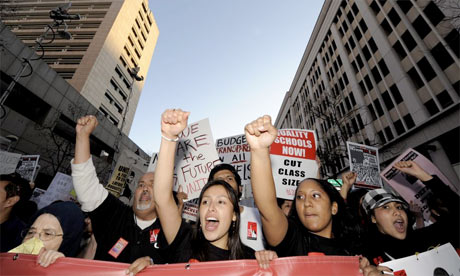
Protesters opposing cuts in education funding march in downtown Los Angeles, California. Photograph: Paul Buck/EPA
Over the next two weeks, more than 5,000 Los Angeles school employees – teachers and other personnel – will receive lay-off notices informing them that they might not have jobs come the start of the next academic year. Not all of them will ultimately lose their salaries, but many likely will. The reason? In addition to the hundreds of millions of dollars the city budget is short by, the school district, which has separate revenue streams, is also in the red by a staggering $640m.
The layoffs aren't just impacting Los Angeles. Around California, the education system is in crisis. Schools in the San Diego area face the loss of hundreds of teachers. In northern towns like Elk Grove, hit particularly hard by the housing bust, about one-sixth of school employees will receive lay-off notices. Even a university town like Davis, which prides itself on having one of the best public school systems in the state, is feeling the pain. Davis, a small town of fewer than 70,000 residents, recently announced that more than 100 teachers would lose their jobs.
With property tax revenues shrinking and state contributions to plug funding gaps on the decline, California's schools are haemorrhaging teachers and non-academic staff, cutting back on virtually every non-mandatory aspect of education – music, arts, science and so on – cleaning facilities less often, reducing special education programmes, and more. Many districts are all-but eliminating the presence of school nurses, counsellors, and psychologists. Teachers are being hit with pay cuts. The length of the school year is being trimmed. I'll stop there, but you can be sure that the list goes on.
What's insane about this is that everyone knows California's heading in the wrong direction here, yet the financial crisis is so vast, and the options for raising taxes so limited at this point because of the toxic politics around the issue, that nobody can see light at the end of this particular tunnel.
By most measures, California already performs poorly when it comes to educating its 6 million-plus public school students. It spends far less per kid than the national average – thus largely negating the arguments of conservatives who say that California's schooling crisis is all to do with overpaid, over-benefited teachers – it has higher student-teacher ratios, it has below-average test scores for maths and reading, and it has higher than average high school drop-out rates.

